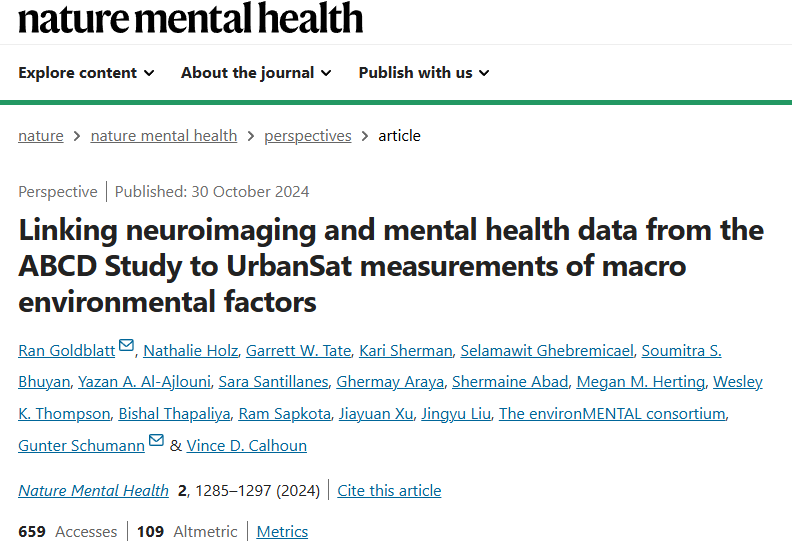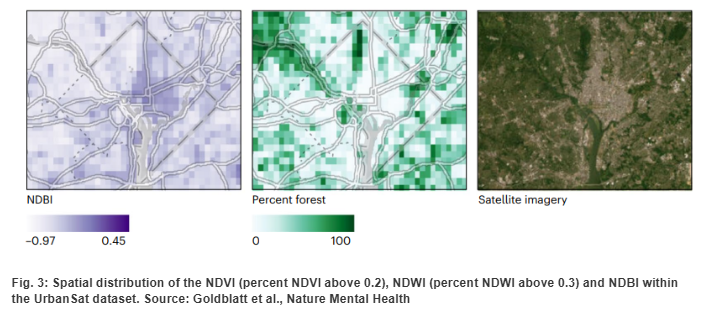Transforming Data into Insights: New Light Technologies, Inc. (NLT) Advances Mental Health Research Through Remote Sensing and Data Science Visualization in a New Study Published in Nature Mental Health
A groundbreaking study recently published in Nature Mental Health conducted in collaboration with the TReNDS Center at Georgia State University, New Light Technologies, Inc. (NLT), and researchers from around the world reveals how urban features such as built environments, nighttime light emissions, and vegetation significantly influence children's brain development, cognition, and mental health. This pioneering research combines satellite-derived environmental data with advanced neuroimaging to provide novel insights into the intricate relationship between urban living and young minds.
The study was led by corresponding authors Dr. Vince D. Calhoun from Georgia State University, Dr. Ran Goldblatt, Chief Scientist at NLT, and a team of prominent researchers from universities and organizations worldwide. In addition to US-based organizations and authors, the leading researchers include numerous global researchers from around the world, including Dr.Gunter Schumann et al., from the German Center for Mental Health (DZPG) in Berlin, Germany, Department for Cognitive Neuroscience, Dr. Nathalie Holz, et al from Radboud University Medical Center Nijmegen, Nijmegen, the Netherlands. The researchers hail from many other countries, including China, UK, Greece, Norway, Austria, Spain, and France.
The following organizations from around the world contributed resources and researchers:
New Light Technologies Inc. (NLT), Central Institute of Mental Health, Heidelberg University, German Center for Mental Health (DZPG), Edward J. Bloustein School of Planning and Public Policy, Rutgers University, New York Medical College School of Medicine, University of California, San Diego, University of Southern California, Keck School of Medicine, Laureate Institute for Brain Research, Tri-institutional Center for Translational Research in Neuroimaging and Data Science (TReNDS), Georgia State University, Georgia Institute of Technology, Emory University, Tianjin Medical University General Hospital, University of Cambridge, Centre for Population Neuroscience and Stratified Medicine (PONS), Institute for Science and Technology of Brain-inspired Intelligence (ISTBI), Fudan University, Charité – Universitätsmedizin Berlin, Nuffield Department of Medicine, University of Oxford, Max Planck Institute for Molecular Genetics, Berlin Institute of Health, Free University Berlin, Radboud University Nijmegen, University Medical Center Schleswig-Holstein, Kiel University, University College London, University of Athens, Norwegian Centre for Mental Disorders Research (NORMENT), Oslo University Hospital, University of Oslo, Norwegian Institute of Public Health, University of Potsdam, Institute of Science and Technology, Klosterneuburg, University of Barcelona, University of Bonn, Research Center Jülich, Ksilink, Aix Marseille Université, Institut National de la Santé et de la Recherche Médicale (INSERM), Virtual Bodyworks, Friedrich Schiller University, Imaging Genetics Center, Mark & Mary Stevens Institute for Neuroimaging & Informatics, Google, King’s College London, School of Computer Science, University of Nottingham
This expansive global collaboration demonstrates the transformative power of collaborative science. By bringing together experts from diverse disciplines, the research underscores the growing potential of geospatial and data science approaches, satellite imagery, clinical sciences, and urban studies to tackle critical societal challenges. A complete list of authors, organizations, and their affiliations is available on the Nature Mental Health website, as referenced below, and NLT’s publications site.

Source: Nature Mental Health
Key Findings
The study uncovered significant associations between environmental indicators and cognitive, behavioral, and mental health outcomes:
- Urban Density and Cognitive Performance: "Without the inclusion of SES, the UrbanSat indicators were associated with cognition and DMN clustering (except for forest land)," highlighting how urban environments correlate with brain network connectivity.
- Artificial Lighting and Mental Health: Nighttime light intensity, often a proxy for urbanization and economic activity, demonstrated a measurable relationship with mental health outcomes.
- Greenness and Cognitive Function: Lifelong exposure to greenery was linked to increased gray and white matter in brain regions critical for working memory and reduced inattentiveness.
The Role of Satellite Imagery, Data Science, and Interdisciplinary Approaches
The study utilized an extensive national clinical data set and environmental variables reflecting land use, vegetation, water presence, and artificial light extracted from satellite imagery. This dataset was seamlessly integrated with the clinical data to explore how diverse urban living conditions influence mental health and cognitive development in children aged 9-10 years.

Advancing Science and Society
This research underscores the critical role of integrating data science methods, geospatial technologies, and analytics with urban planning, environmental science, and public health to foster healthier and more resilient communities. By illustrating the impact of urban living on children’s mental and cognitive health, the study offers actionable insights for policymakers and urban designers. This landmark study exemplifies the transformative power of collaboration, innovation, and science in addressing global challenges and shaping a healthier, more sustainable future.
Learn More
To learn more about this and other scientific research projects and papers, visit NLT’s Publications page.
About New Light Technologies
New Light Technologies Inc. (NLT) is a leading provider of integrated science, technology, and mission services with over 20 years of experience serving government and commercial organizations. Offering renowned expertise in cloud, agile software development, cybersecurity, data science, geospatial, and remote sensing, NLT provides comprehensive consulting, research, digital transformation services, and fit-for-purpose analytics solutions for various industries, from emergency management to economics to health. NLT offers distinctive capabilities in delivering secure cloud-native platforms and web-based decision support tools and has pioneered predictive disaster risk analytics in support of homeland security missions. To learn more, visit www.NewLightTechnologies.com.